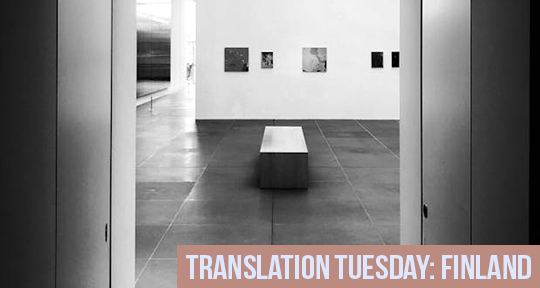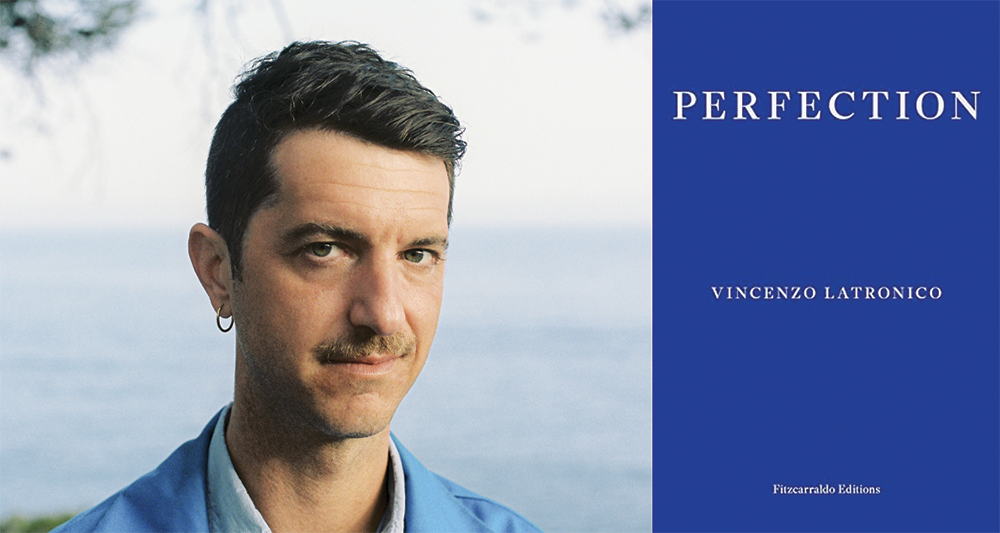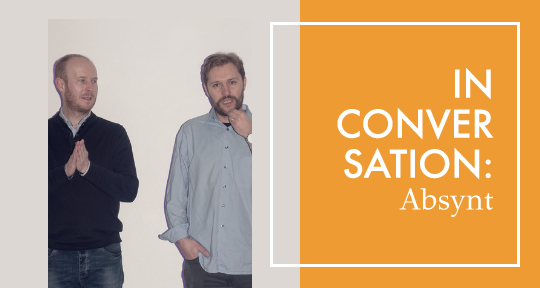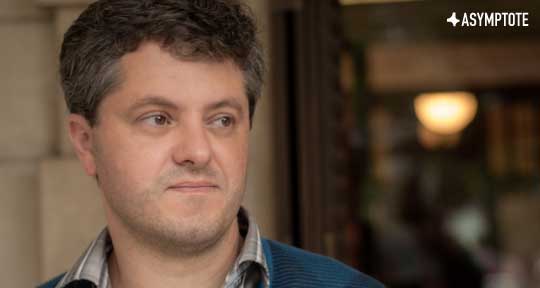What’s the longest you’ve ever gone without sleeping? 50 hours? 70? What about 200? In this week’s Translation Tuesday, the unnamed protagonist of Maisku Myllymäki‘s novel The Guard has been awake so long they have to write the day of the week on their hand to remember that it’s Sunday. Yet in spite of their insomnia, they remain almost hypnotically attentive: to the pilasters of columns and poorly-named green paint in the atrium of the museum where they work, to the remembered touch of their boyfriend, to the asinine behavior of museum-goers and to the strange effect of social media on personal identity. Translated into deft and subtle prose by Tabatha Leggett, this excerpt is sure to leave you eagerly awaiting a full translation of the novel. Read on!
It’s December 9, the final day of the exhibition. Tomorrow, the people in dark blue and sand grey coloured overalls will pack it all away. They’ll destroy the setting in which Peter and I first met eight months ago. They’ll wrap the artworks in paper and protective plastic sheeting and pack them into bespoke wooden chests. This is meticulous work. The art will be handled with the kind of deep tenderness very few living beings ever truly experience. Sometimes Peter touches me that way.
Once the artworks have been packed into their respective chests, they’ll be carried out of these halls. The heaviest chests will be lowered to the ground by crane. After, they’ll be sent to new halls, new exhibition spaces. They’ll traverse the sea, cross city and country borders. They’ll see things I never will. And soon, new sets of eyes will see them.
I’m sitting on a tall, black stool in the corner—the very stool on which I’ve spent countless hours sitting these past eight months and long before, supervising different artworks, different kinds of exhibition. It’s hard to remember exactly how long I’ve worked here. It’s the kind of job where nothing really gets done, no progress is made during the hours I spend in this hall. For me, a regular work day is one in which nothing extraordinary happens. In that sense, you might compare my job to that of a lifeguard.








We Stand With Ukraine: “The Ghost of Kyiv” by B. R. Dionysius
Through his phone’s / cracked canopy he plays you a black streak / over Kyiv
In this week’s edition of literary works written in support and solidarity with the citizens of Ukraine, we are proud to present a poem by B. R. Dionysius. “The Ghost of Kyiv” movingly comments on the distancing voyeurism of watching tragedy unfold from afar, and of wide-ranging human affairs condensed into byte-sized consumption. As we continue to navigate the ever-shifting boundaries between the virtual and the real, Dionysius’ poem works between man and machine, its precise lines edging out the bodies caught within them.
The Ghost of Kyiv
Your son shows you a Tik Tok clip;
You both play Russian computer games.
Simulators that glorify World War Two/
mid-century armour & the cold war era
where each new development increased
penetration; rounds that defeated steel’s
stubborn thickness. You watch your son
take to the skies over maps of Ukraine.
1941. Get shot down a lot. The next best
thing to flying solo. Through his phone’s
cracked canopy he plays you a black streak
over Kyiv; a medieval, barbed arrowhead
punching through the sky’s grey cuirass. For
fifty years the fulcrum has been idle; three up
-grades, engines, radar, missiles, but never seen
combat. Seventies bones good enough to mix
it over the capital with its modern successors,
flankers & frogfeet; a retro jet where the ghost
got good purchase from his re-engineered multi-
role fighter. The first ace in a day in fifty years.
Not since Alam’s F-86 sabre rattled in the Indo-
Pakistani war has the aerial world revelled in six
kills in one day. Your son doesn’t bother to fact
check the video, sold on social media’s bravado;
a pilot’s last stand. He tells you the ghost was shot
down, but ejected. His short clip trimmed to fit.
READ MORE…
Contributor:- B. R. Dionysius
; Place: - Ukraine
; Writer: - B. R. Dionysius
; Tags: - machinery
, - Poetry
, - social commentary
, - social media
, - voyeurism
, - War